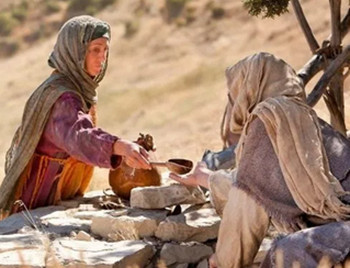The struggle to live as Christians can feel at times like a journey through a barren desert. In daily life there is often little around us that refreshes or supports our faith. Where shall we find the faith-renewing water we need? To whom shall we go? Questions of faith don’t get any more basic than that. It is the question the disgruntled Israelites asked in the desert. It is a question that a sarcastic Samaritan might imply and at times it is our question too. Today’s readings might give us an insight for our own faith journey - especially if we are in the midst of our own desert.
 The first reading from Exodus is one of a series of stories where we find the people of Israel mumbling and grumbling. (It seems grumbling was the Israelites’ way of life.) The whole episode happens in a place which will eventually be called "Massah and Meribah" - Massah, meaning "testing" and Meribah,meaning "dissatisfaction." The story gets right to the point — the people are tired and thirsty, and God gives them the water they need. To their question, "Is the Lord in our midst or not?" the answer is straight forward and immediate. God becomes present in front of them and flowing water is provided. God will not let His people die in the desert.
The first reading from Exodus is one of a series of stories where we find the people of Israel mumbling and grumbling. (It seems grumbling was the Israelites’ way of life.) The whole episode happens in a place which will eventually be called "Massah and Meribah" - Massah, meaning "testing" and Meribah,meaning "dissatisfaction." The story gets right to the point — the people are tired and thirsty, and God gives them the water they need. To their question, "Is the Lord in our midst or not?" the answer is straight forward and immediate. God becomes present in front of them and flowing water is provided. God will not let His people die in the desert.
The point of the story is not simply to emphasize the distrust of the people, but to stress God’s prevailing care for them.
God’s continuing care for His people is displayed once again as we hear Jesus’ dialogue with the woman at the well. Jesus first asks for a cup of water, but then - almost immediately - offers to her the spring of life everlasting. A first read of her response gives the impression that she immediately recogized that this man might indeed have something she needed. But I think it might be a little different. I think her response is a bit sarcastic: "Sure, you're going to give me life-giving water? OK, give this water to me. I'll take it. I won't ever be thirsty again. And I definitely won't have to come back here anymore!" I can imagine Jesus quietly smiling at her. Notice that he doesn't really address her answer. Instead he tells her to go and return with "her husband." And this triggers within her the realization of how deep her thirst really was.
Hers was a thirst that the water she went to draw from the well could not satisfy. Ultimately, she found someone who touched her heart like never before. We listen in on the conversation and even before she goes back to tell her townsfolk what she has learned, we learn something about Jesus. The woman is helping us discover who he is. Can we admit our thirst? Shall we too engage Jesus in a conversation of the heart? It will require the honesty the woman portrays. She shows us that we need to listen to what he has to say. And like her, we must be willing to have a change of heart.
The woman at the well has set a good example for us. She was willing to break the pattern of her routine, ask important questions, listen to the answers and make the adjustments necessary in her life. What is true for her is true for us.
In small ways, we test our willingness to die, to obey, to give up something precious, to pay the price of discipleship. During Lent we try to reflect, to reach out and freely embrace the Cross. But we can only do this if we have first experienced the desert when life presses down on us from many sides and we find it too much to handle. Like the Israelites in the desert we learn to trust God. Like the Samaritan woman we can reach deep within ourselves and get a glimpse at the truth that leads to living water.
These are not things that we can learn all at once. Instead, as God provides for us each day we are reminded again and again of our dependence on Him and His gracious generosity towards us. This can lead us from sarcasm to prayer: "Sir, give me this water." It’s a prayer often said and learned through experience, one day at a time.





